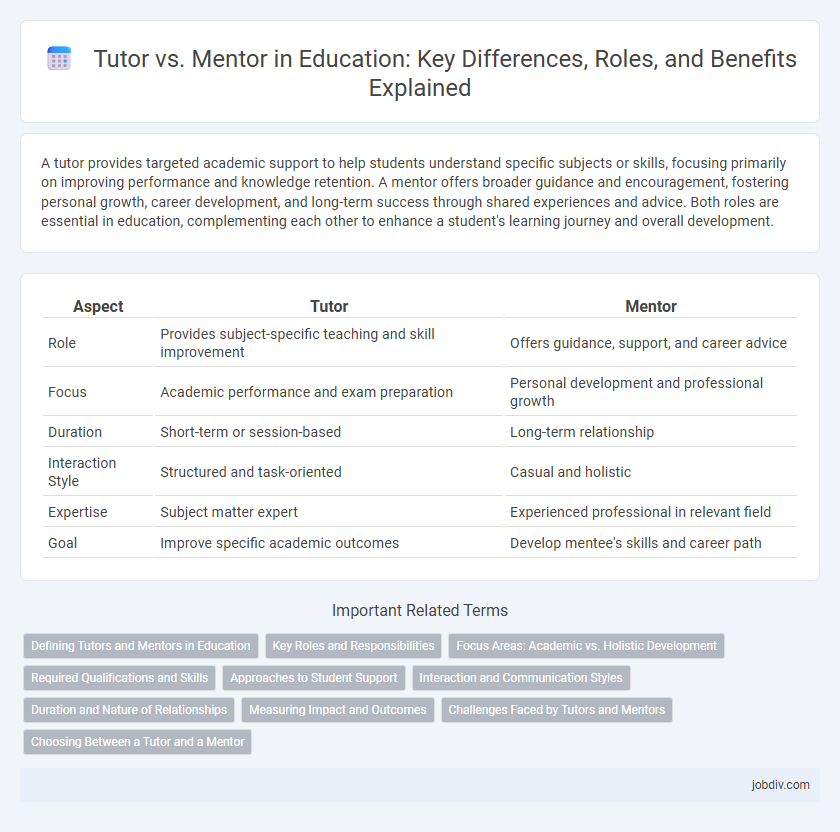A tutor provides targeted academic support to help students understand specific subjects or skills, focusing primarily on improving performance and knowledge retention. A mentor offers broader guidance and encouragement, fostering personal growth, career development, and long-term success through shared experiences and advice. Both roles are essential in education, complementing each other to enhance a student's learning journey and overall development.
Table of Comparison
| Aspect | Tutor | Mentor |
|---|---|---|
| Role | Provides subject-specific teaching and skill improvement | Offers guidance, support, and career advice |
| Focus | Academic performance and exam preparation | Personal development and professional growth |
| Duration | Short-term or session-based | Long-term relationship |
| Interaction Style | Structured and task-oriented | Casual and holistic |
| Expertise | Subject matter expert | Experienced professional in relevant field |
| Goal | Improve specific academic outcomes | Develop mentee's skills and career path |
Defining Tutors and Mentors in Education
Tutors in education provide targeted academic support by focusing on specific subjects or skills to improve student performance through personalized instruction and practice. Mentors offer broader guidance, fostering personal and professional growth by sharing experience, advice, and encouragement beyond the classroom. Understanding these distinct roles helps institutions design effective support systems that cater to diverse student needs in both learning and development.
Key Roles and Responsibilities
Tutors primarily focus on delivering subject-specific knowledge, clarifying concepts, and improving academic performance through targeted lessons and assessments. Mentors provide personalized guidance, career advice, and emotional support, fostering long-term professional and personal development. Both roles emphasize building trust and communication, but tutors concentrate on skill mastery while mentors encourage holistic growth.
Focus Areas: Academic vs. Holistic Development
A tutor concentrates primarily on academic subjects, providing targeted instruction and support to improve specific skills and knowledge in areas like math, science, or language arts. A mentor emphasizes holistic development, offering guidance on personal growth, career planning, and social skills, fostering long-term success beyond academics. Academic focus in tutoring enhances grades and comprehension, while mentoring nurtures emotional intelligence, self-confidence, and life skills essential for overall development.
Required Qualifications and Skills
Tutors typically require strong subject-matter expertise, relevant academic qualifications, and the ability to deliver structured lessons that address specific learning goals. Mentors demand not only knowledge but also excellent interpersonal skills, emotional intelligence, and experience to guide personal and professional growth effectively. Both roles benefit from strong communication abilities, but mentors emphasize long-term development while tutors focus on immediate academic improvement.
Approaches to Student Support
Tutors provide targeted academic support by focusing on specific subject matter and skill development, often using structured lessons and personalized feedback to address learning gaps. Mentors emphasize holistic guidance, fostering personal growth, motivation, and long-term goal setting through experience sharing and continuous encouragement. Combining both approaches enhances student success by balancing immediate academic assistance with broader developmental support.
Interaction and Communication Styles
Tutors typically engage in structured, goal-oriented interactions, focusing on clarifying specific academic concepts and providing direct feedback to enhance student understanding. Mentors foster open-ended, relationship-based communication that emphasizes personal growth, motivation, and long-term guidance beyond immediate academic needs. The dynamic, dialogic exchange in mentoring promotes reflective thinking, whereas tutoring relies more on instructional clarity and precision.
Duration and Nature of Relationships
Tutors typically engage in short-term, goal-oriented relationships focused on improving specific academic skills or knowledge. Mentors build long-term, holistic relationships aimed at personal and professional growth, offering guidance beyond immediate educational needs. The duration and depth of interaction distinguish tutors as skill-focused instructors and mentors as supportive advisors fostering overall development.
Measuring Impact and Outcomes
Tutors primarily measure impact through students' academic performance improvements, such as test scores and assignment grades, while mentors assess long-term outcomes like personal growth, career development, and confidence building. Quantitative data from tutoring sessions often includes progress tracking and skill mastery, whereas mentoring outcomes rely on qualitative feedback and goal achievement evaluations. Combining both approaches provides a comprehensive view of educational impact, supporting both immediate learning gains and sustained developmental success.
Challenges Faced by Tutors and Mentors
Tutors often face challenges such as addressing diverse learning styles, managing time constraints, and maintaining student motivation during individualized sessions. Mentors struggle with establishing trust, providing consistent guidance over extended periods, and balancing professional boundaries while supporting mentees' personal and career growth. Both roles demand strong communication skills and adaptability to meet the unique needs of learners effectively.
Choosing Between a Tutor and a Mentor
Choosing between a tutor and a mentor depends on the learner's specific needs and goals; tutors provide targeted academic support and skill reinforcement, while mentors offer broader guidance, career advice, and personal development. A tutor typically addresses immediate challenges in subjects like math or science, enhancing comprehension and exam performance, whereas a mentor fosters long-term growth through experience sharing and networking opportunities. Evaluating whether you need focused instruction or holistic development can guide the selection of either a tutor or mentor in educational settings.
Tutor vs Mentor Infographic

 jobdiv.com
jobdiv.com